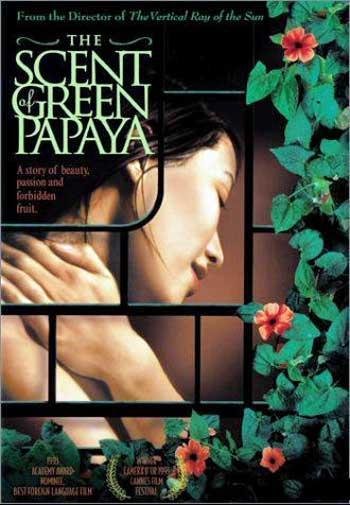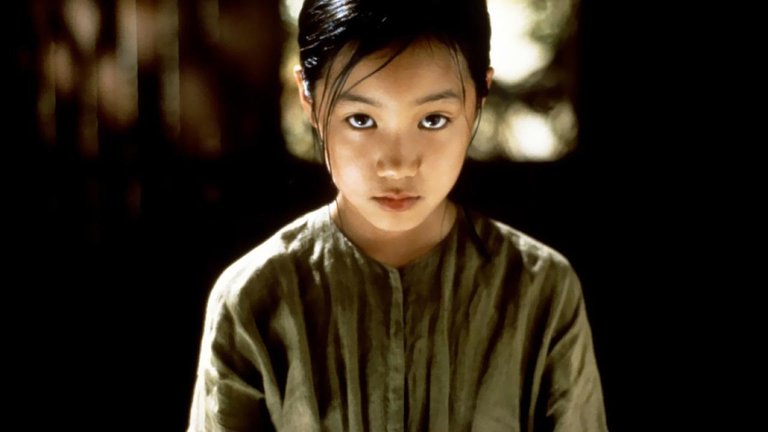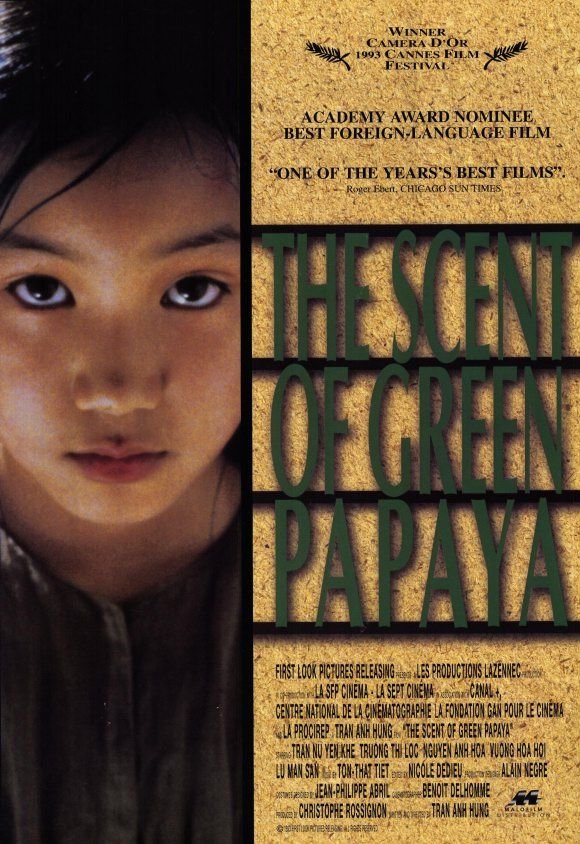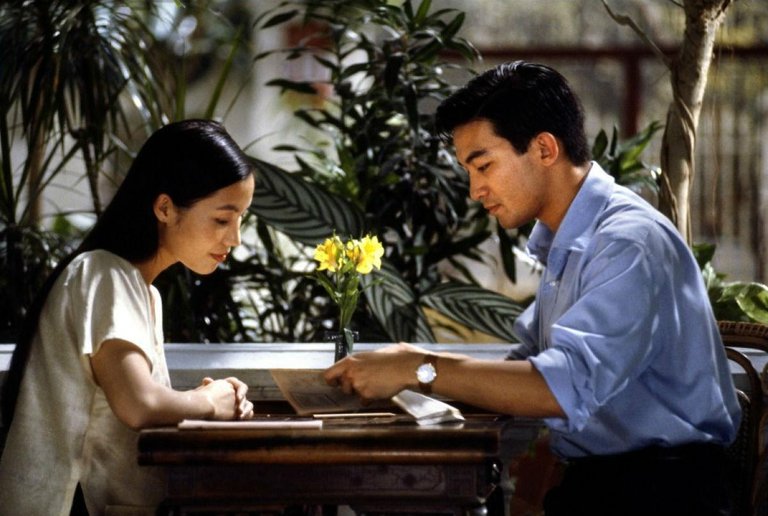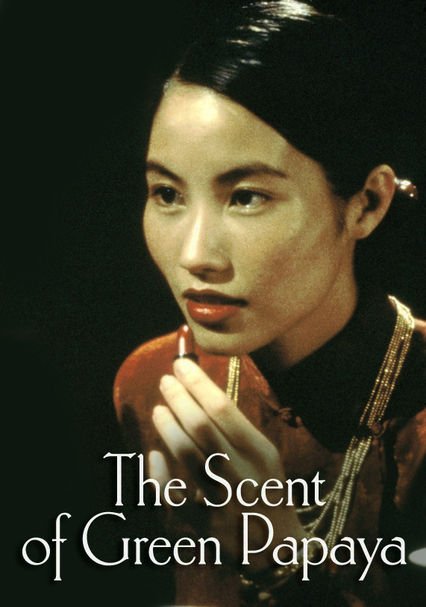
Ganadora de varios premios alrededor del mundo
A few days ago I posted a review of To Live, a Chinese film from 1994 and I mentioned in that post that Asian cinema was much more than Japanese and Korean films. I talked about other "lost" corners of the continent where good stories are also produced and today I bring you a review from the well-known and at the same time mysterious Vietnam.
Hace algunos días subí la reseña de To Live, una película china de 1994 y mencioné en ese post que el cine asiático era mucho más que películas japonesas y coreanas. Hablé de otros rincones "perdidos" del continente en donde también se producen buenas historias y hoy les traigo una reseña desde la conocida y a la vez misteriosa Vietnam.
Mùi du du xanh (L'odeur de la papaye verte), better known as The Scent of the Green Papaya is the debut feature by Tran Anh Hung who wrote and directed it in 1993 and with which he won two awards at the Cannes Film Festival (Camera d'Or and Youth Award), a César Award (Best First Feature) as well as other important distinctions and nominations including one for the Academy Awards for Best Talking Film not English.
It's a drama that tells the story of Mui, a girl who arrives in the city at the beginning of the fifties to work as a servant in a family home, leaving her mother and sister behind in her villa. Mui has a kind, docile and helpful character. She's quiet and very observant, as well as intelligent, which is why it doesn't take long for her to win the sympathy of the bosses and the housekeeper (although the youngest of the couple's three children lives constantly bothering her). As the story progresses and we see her getting used to her job, we are getting news from the family and we are finding out about different events in their lives, one of the most notable being the death of the only girl in the family, who died of an illness seven years ago when she was barely three. If To (that was the girl's name) hadn't died, she would be Mui's age.
Mùi du du xanh (L'odeur de la papaye verte), mejor conocida como The Scent of the Green Papaya es la ópera prima de Tran Anh Hung quien la escribió y dirigió en 1993 y con la que obtuvo dos premios en el Festival de Cannes (Cámara de Oro y Premio de la juventud), un Premio César (Mejor ópera prima) además otras importantes distinciones y nominaciones incluyendo una para los premios de la Academia como Mejor Película de habla no Inglesa.
Se trata de un drama que cuenta la historia de Mui, una niña que llega a la ciudad a inicio de los años cincuenta para trabajar como sirvienta en una casa de familia dejando atrás, en su villa, a su madre y una hermana. Mui tiene un carácter amable, dócil y servicial. Es callada y muy osbervadora, además de inteligente, por lo que no tarda en ganar la simpatía de los patrones y de la ama de llaves (aunque el menor de los tres hijos de la pareja vive constantemente molestándola). Conforme avanza la historia y la vemos acostumbrarse a su trabajo, vamos teniendo noticias de la familia y nos vamos enterando de diferentes hechos en la vida de ellos siendo uno de los más destacados la muerte de la única niña de la familia, fallecida por una enfermedad siete años atrás cuando apenas tenía tres. Si To (ese era el nombre de la niña) no hubiera muerto, tendría la edad de Mui.
In the same way we find out about the death of our grandfather, about the times when the husband ran away from home taking the money from the modest haberdashery that they have on one side of the house (which is their only source of money) and about other events that occurred long ago; and at the same time we are better understanding the character of Mui, the children of the house, the adults, etc.
De la misma forma nos enteramos de la muerte del abuelo, de las veces en que el esposo escapó de casa llevándose el dinero de la modesta mercería que tienen a un lado de la casa (la cual es su única entrada de dinero) y de otros hechos ocurridos tiempo atrás; y al mismo tiempo vamos comprendiendo mejor el carácter de Mui, los niños de la casa, los adultos, etc.
I really enjoyed the photography of the film and the editing. The scenery is limited, the street is seen to be a studio built for it and most of the story takes place inside the house and on the adjoining street; however, the movements of the camera that often follow the movements of Mui or the members of the family help to magnify that space and the script forces you to concentrate on the story, on Mui's actions, rather than on the set. I have no idea how much the film's budget would have been, but it shows that it was a modest budget and the fact that the film works so well with such an honest, simple and beautiful story, without the need for special effects, filming outdoors or spending large sums of money is a feature to highlight. It's not the first time that I have mentioned this fact, but imagine what directors and producers like these could do with more money or the number of great films that could be made with all the money that is often invested in unsuccessful films of poor quality.
Disfruté mucho la fotografía de la película y el montaje. La escenografía es limitada, se ve que la calle es un estudio construido para ello y la mayor parte de la historia se desarrolla dentro de la casa y en la calle contigua; sin embargo, los movimientos de la cámara que siguen muchas veces los movimientos de Mui o de los miemros de la familia ayudan a magnificar ese espacio y el guión te obliga a concentrarte en la historia, en las acciones de Mui, más que en el decorado. No tengo idea de cuánto habrá sido el presupuesto de la película, pero se nota que fue un presupuesto modesto y el hecho de que la película funcione tan bien con una historia tan honesta, tan sencilla y tan hermosa, sin necesidad de efectos especiales, filmaciones en exteriores ni gastar grandes sumas de dinero es un rasgo a destacar. No es primera vez que menciono este hecho, pero imaginen lo que podrían hacer directores y productores como estos con más dinero o la cantidad de grandes películas que se podrían hacer con todo el dinero que muchas veces se invierten en cintas poco exitosas y de una calidad cuestionable.
For the last half hour of the story we find ourselves thrown ten years into the future. Mui is a young woman of great beauty and an expert in housekeeping, but the family cannot pay her and they refer her to another master: Khuyén, a successful composer who also used to visit them because he was a friend of the couple's eldest son. Khuyén is an attractive man and in fact, as a girl, Mui had noticed it.
Para la última media hora de la historia nos vemos lanzados diez años en el futuro. Mui es una joven de gran belles y una experta en la atención de la casa, pero la familia no puede pagarle y la refieren a otro amo: Khuyén, un exitoso compositor que además solía visitarlos porque era amigo del hijo mayor de la pareja. Khuyén es un hombre atractivo y de hecho, siendo niña, Mui lo había notado.
I also liked how the love story between Mui and Khuyén developed because they never said anything to each other. Everything is shown through gestures, looks, actions, but in the most complicit secret. Throughout the movie we saw a silent Mui and even when she feels strongly attracted to her new master, she doesn't say a word. But this silence works well thanks to the visual poetry of the director who reveals things to us, even from the future, through images (for example, he tells us that they are both expecting a girl without having to say anything) which requires an attentive viewer, observant and truly immersed in the film experience. The tropical climate of Vietnam, the rain, the humidity, the light, the flora and fauna of the gardens of the houses, all of this is also felt through the screen and one feels that for about a hundred minutes one has been in that remote country, have any of you seen this movie? Do you know anything else from Vietnam? I read you in the comments.
También me gustó cómo se desarrolló la historia de amor entre Mui y Khuyén porque en ningún momento se dijeron nada. Todo se muestra a través de gestos, miradas, acciones, pero en el más cómplice secreto. Durante toda la película vimos a una Mui silenciosa y aún cuando se siente atraída fuertemente por su nuevo amo, no pronuncia palabra. Pero este mutismo funciona bien es gracias a la poesía visual del director que nos revela cosas, incluso del futuro, a través de imágenes (por ejemplo, nos dice que ambos esperan una niña sin necesidad de decir nada) lo que exige un espectador atento, observador y de verdad sumergido en la experiencia fílmica. El clima tropical de Vietnam, la lluvia, la humedad, la luz, la flora y fauna de los jardines de las casas, todo eso también se siente a través de la pantalla y uno siente que por alrededor de cien minutos ha estado en ese remoto país, ¿alguno de ustedes ha visto esta película? ¿conocen algo más proveniente de Vietnam? Los leo en los comentario.
Reviewed by | Reseñado por @cristiancaicedo
Other posts that may interest you | Otros posts que pueden interesarte:
  |
|---|
